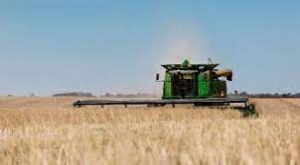


(Posted on 04/05/21)
Australia’s peak national grain grower advocacy group has welcomed the Australian Government’s announcement today of stronger measures to protect their industry from devastation, with a $371 million biosecurity package in the upcoming Budget.
Grain Producers Australia Deputy Chair and Western Australian grain farmer, Barry Large, said the investment program was another positive step towards modernising national biosecurity with stronger preventative measures.
“Australian grain farmers welcome today’s announcement by Prime Minister, Scott Morrison, and Minister for Agriculture, Drought and Emergency Management, David Littleproud, to increase government investment in surveillance technologies, tools and capability for Australia’s biosecurity systems,” he said.
“In particular, GPA welcomes $34.6 million to go towards new research to more clearly identify biosecurity risks and develop improved surveillance and inspection tools.
“We also welcome the announcement of $96.8 million for the offshore treatment provider assurance program, and data and technology advancements to rapidly identify containers for intervention; $25.5 million for modern technologies to improve the speed and accuracy of pest and disease identification at the border.
“GPA was part of the steering group which developed the National Biosecurity Statement and the government’s announcement of $3.9 million to increase community and business biosecurity awareness is a great step towards increasing broader community awareness, identified as critical within that Statement.”
Mr Large said this investment in the 2021-22 Federal Budget shows the Australian Government has listened and responded to GPA’s ongoing calls to step up and strengthen biosecurity programs, to help protect Australian grain farmers from potential devastation.
“By investing in better front-line biosecurity measures, the Australian Government is demonstrating it not only understands the importance of protecting Australian agriculture from devastating pest and disease incursions, but also the need to invest proactively in protecting our economy and communities,” he said.
“As the Coronavirus outbreak has clearly demonstrated, small, hidden threats can sneak through our borders undetected and deliver a massive hit to the national economy, stopping businesses and altering lives, virtually overnight.
“Australian grain producers contribute between $9 billion and $12 billion to the national economy each year and the grains industry is the largest of Australia’s $33 billion plant-based agricultural industries.
“Our international reputation for low pest status and strict biosecurity is key to maintaining $27 billion worth of plant-based exports, which helps fuel the economy, create jobs and feed the world. That’s why ongoing investment in strengthening Australian biosecurity protections is also an investment in building safer, stronger rural economies and communities.”
Trafigura Group Pte Ltd, a global leader in the commodities industry, has announced its financial results... Read more
Rio Tinto has successfully produced the first copper from the Johnson Camp mine in Arizona using its... Read more
The American Soybean Association’s World Initiative for Soy in Human Health programme and the... Read more
Karlka Nyiyaparli Aboriginal Corporation (KNAC) Registered Native Title Body Corporate and Rio Tinto... Read more
OCI Global, a leading global producer and distributor of nitrogen products has announced that it has... Read more
In December 2024, SSAB was granted a permit by the Land and Environment Court at Umeå District... Read more
The President of the Republic of Guinea has joined project partners WCS1, Baowu, Chinalco and Rio Tinto... Read more
GSC (Global Strategic Commodities) has announced the launch of its dedicated mining advisory division... Read more
SSAB AB has successfully issued its inaugural green bonds under its EUR 2 billion EMTN programme, dated... Read more
On 9 September 2025, Anglo American plc and Teck Resources Limited announced that they had reached an... Read more